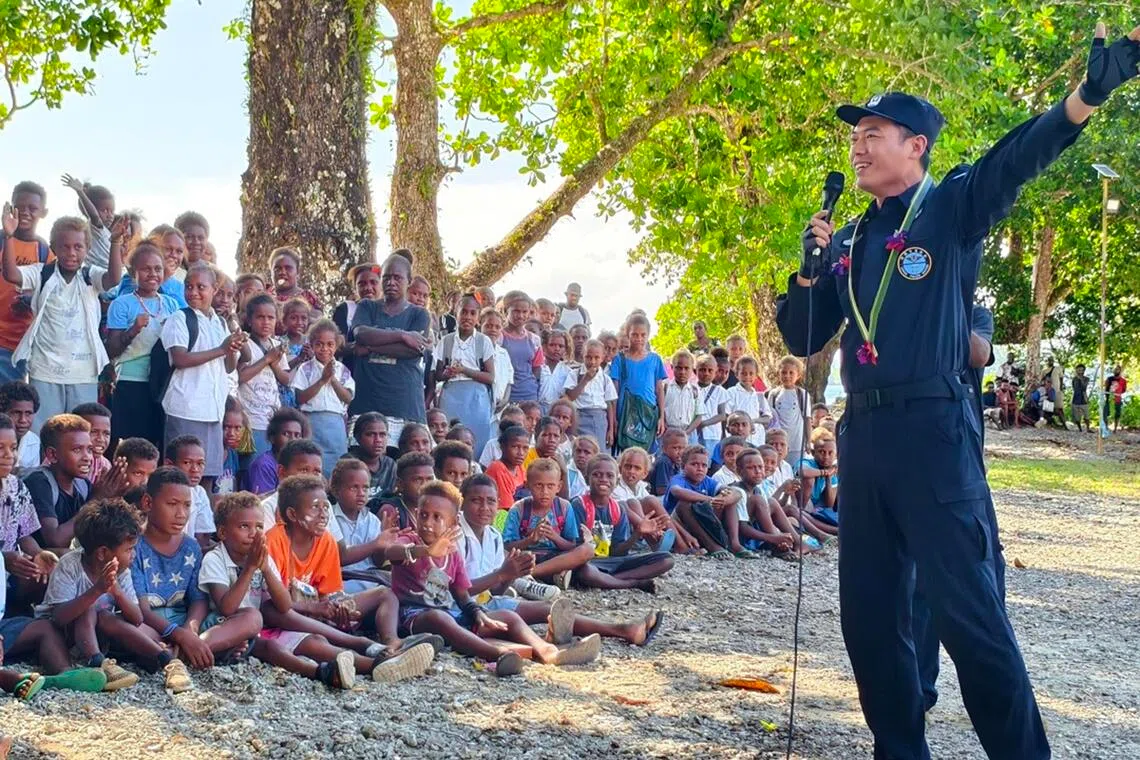Pacific policing becomes new front in China-West rivalry
Sign up now: Get insights on Asia's fast-moving developments

The Royal Solomon Islands Police Force and the China Police Liaison Team conducting community policing awareness in Malaita Province.
PHOTO: ROYAL SOLOMON ISLANDS POLICE FORCE
- China is increasing its policing presence in the Pacific by providing equipment and training, filling capability gaps.
- This increased presence has caused unease among Australia and the US, who are stepping up their aid to counter China's growing influence.
- Pacific nations want to avoid getting caught in geopolitical rivalries, and regional cooperation remains a priority despite bilateral deals.
AI generated
WELLINGTON – In Vanuatu, the police force marked a milestone in July – officers finally have the authority to pull over a driver, conduct a roadside breathalyser test and detain anyone whose blood alcohol level exceeds 0.03 per cent.
This new enforcement power came not only from a law change, but also from Beijing. China supplied breathalyser kits and later dispatched a police expert team to train Vanuatu’s traffic officers on their use, a move proudly publicised by the Chinese embassy in the Pacific island nation.
Weeks later, Vanuatu’s government received seven Chinese-donated patrol boats, handed over at a ceremony attended by Prime Minister Jotham Napat and Chinese Ambassador Li Minggang. Mr Napat hailed the boats as a symbol of “trust and cooperation” – the latest in a string of Chinese equipment donations to the country, typically paired with training.
China has been supporting other nations, too, and across the Pacific, Beijing has become an increasingly visible policing partner.
But while the equipment and training have been welcomed by the host nations, it has also stirred unease, with China’s growing Pacific presence regarded with suspicion by Australia, the US and others. China has been trying to expand its military presence in the region, triggering moves by Canberra and Washington to counter this by increasing aid.
Analysts say China’s expanding police presence not only helps fill urgent capability gaps for under-resourced Pacific nations, but it is also a strategic manoeuvre – strengthening a security presence that is more acceptable than a military one.
“China’s contributions have largely centred on technical assistance and assets... tailored to the specific needs of the requesting country,” said Pacific issues specialist Sione Tekiteki, adding that they allow Pacific nations to have greater autonomy without being reliant on any one partner. Mr Tekiteki is also a senior lecturer at Auckland University of Technology’s law school.
The increasingly visible Chinese police deployment ultimately gives Beijing a platform to “normalise its security presence” in the Pacific, said analyst Mihai Sora, programme director of the Pacific Islands Programme at the Lowy Institute in Sydney.
“It is pursuing vectors that would be seen as less provocative than outright military presence, such as through policing and coast guard activity. Overall, Beijing wants to give itself elbow room to operate as a security actor in the region as it expands its naval power projection and contests traditional security partners’ access to the region,” Mr Sora told The Straits Times.
In the Solomon Islands, Chinese officers have been embedded since 2021, providing training in riot control, scam investigation and traffic management, on top of donations of drones, police gear and screening equipment. They are also piloting China’s “Fengqiao” village surveillance model, collecting population data to curb social unrest, Reuters reported on Sept 12.
Beijing funded Samoa’s first police training academy, which opened in 2024 and graduated its first batch of recruits in July 2025. And in Kiribati, Chinese advisers have rotated through local police precincts, helping to manage crime data and community responses.
A mapping by The Guardian in July 2024 of all the security, defence and policing deals with the 10 largest Pacific nations showed that Australia remains the dominant partner in the region. But China’s footprint has not gone unnoticed, having developed multiple new initiatives to support policing in the region in recent years.

Australia’s police vehicle donation to the Solomon Islands in the lead-up to the Pacific Islands Forums Leaders Meeting in Honiara.
PHOTO: SOLOMON ISLANDS GOVERNMENT
China’s embassy in the Solomon Islands defended its policing arrangements as “normal law enforcement and security cooperation between two sovereign states”. Its spokesman told ST these deals were “arranged at the request of the Solomon Islands, based on its needs, and reached through equal consultation” to improve the country’s law enforcement capacity and capability.
For under-resourced countries like Samoa, whose priority is economic development, China, as one of its major donors, is a big contributor to infrastructure development, Samoan High Commissioner to New Zealand Faamatalaupu Toleafoa said in an interview with ST.
He said the relationship between Samoa and China has been kept at a comfortable level that does not impose on other critical issues such as taking sides, accepting support or giving maritime access for Chinese vessels.
But concerns linger for some countries. For example, Fiji expelled the embedded Chinese police officers in 2024 amid fears of undue influence, surveillance of Chinese citizens and extra-territorial arrests that threatened Fiji’s sovereignty, as pointed out by Mr Sora.
Western partners have also begun to respond.
Interpol is pushing to establish its first Pacific base. Secretary-General Valdecy Urquiza travelled to Waitangi in New Zealand to attend the Pacific Islands Chiefs of Police Annual Conference on Aug 22 to win support from the attending 22 Pacific Island nations.
The proposal already has the endorsement of New Zealand police commissioner Richard Chambers. Mr Chambers noted in an interview with The New Zealand Herald that he supports a bigger New Zealand police presence in the Pacific to counter growing geopolitical interest. ST is awaiting comment from Interpol on the outcome of its proposal.
New Zealand’s Ministry of Foreign Affairs and Trade emphasised to ST that its position remains “Pacific-led”.
“There are established regional mechanisms where security issues, including police cooperation, can be discussed. New Zealand supports Interpol in the Pacific through funding the Interpol Blue Pacific project through the Pacific Chiefs of Police,” a ministry spokesman said, highlighting that Wellington has invested more than NZ$65 million (S$49 million) in Pacific policing over the past five years, with a further NZ$10 million committed.
Meanwhile, when the US Federal Bureau of Investigation opened its first standalone office in Wellington in July, director Kash Patel explicitly pointed to the Communist Party of China’s influence in the Indo-Pacific region as among the top of its concerns. Other issues included countering narcotics trade and cyber intrusion.
Australia, too, is stepping up. Mr Sora said that besides publicly calling out China, Canberra, which has police cooperation programmes in almost every Pacific country, is seeking to increase its support and elevate formal security cooperation with many of them.
Prime Minister Anthony Albanese launched a A$400 million (S$338 million) Pacific Policing Initiative in 2024. The plan, backed by Pacific leaders, gives financial support for a major training facility in Brisbane, four regional training centres in the Pacific and a rapid-response “Pacific Police Support Group” for crises and major events.
However, Mr Albanese’s bid to land a A$500 million security pact with Vanuatu in a recent visit there was unsuccessful as the Vanuatu government had concerns that the pact might limit its engagement with other countries.
Mr Albanese’s plan on signing a landmark mutual defence treaty with Papua New Guinea (PNG) fell through on Sept 17, ostensibly because PNG’s Cabinet did not have enough members to endorse the treaty in time. Canberra is also seeking a security deal with Fiji.
Mr Toleafoa echoed the concerns of Pacific nations being caught in the crossfire of great-power rivalry. “Pacific islands like Samoa have made it clear that we would rather not be involved in geopolitical rivalry between the powers. We don’t want to choose one or the other,” he said, stressing that it is important that the rivalries do not develop into the use of force in the region.
Mr Sora noted that there is clearly competition to be the “security partner of choice” between China and the traditional powers.
This manifested clearly when Australia and China competed to donate new sport utility vehicles to the Royal Solomon Islands Police Force in the weeks leading up to the Pacific Islands Forum (PIF) that was held earlier in September. Solomon Islands Prime Minister Jeremiah Manele received the cars from the two countries – 22 out of 61 from Australia and 27 out of 40 from China arrived on the same day – and announced them in back-to-back media releases by the government.

Solomon Islands Prime Minister Jeremiah Manele receiving new vehicle fleet from China for the Pacific Islands Forum.
PHOTO: SOLOMON ISLANDS GOVERNMENT
The PIF was held in Solomon Islands capital Honiara, where security was once again in the spotlight, though leaders are keen to stress their support for regional solidarity.
Reiterating China’s respect for existing cooperation mechanisms, the spokesman for China’s embassy in the Solomon Islands told ST that the Pacific is “the common home of regional countries, not anyone’s ‘backyard’ or ‘territory’”.
Mr Tekiteki observed that Pacific nations differ in their approach to Chinese policing, depending on their individual needs and domestic context. In the case of the Solomons Islands, its history of internal security challenges makes outside assistance and diversifying partners more appealing.
“Pacific nations typically don’t conspire to exclude any partner at the regional level. But the proliferation of bilateral deals with China, alongside traditional support from Australia and New Zealand, risks stretching regional unity further,” he added.
Although individual Pacific states are negotiating their own deals with China or other donors, Mr Toleafoa concluded that regional cooperation, a guiding principle of PIF since its formation in 1971, is still a priority.
“For the Pacific Islands, we’re too small to be able to influence anything on our own,” he said. Therefore, at a time when great power rivalries are moving from other parts of the globe to the Pacific, it is essential that the region stay together, said Mr Toleafoa.
“I think that’s possible and that’s happening,” he noted.
Ong Hui Fang, who was formerly with the Chinese media group at SPH Media, is now based in Wellington and writes about New Zealand for The Straits Times.



